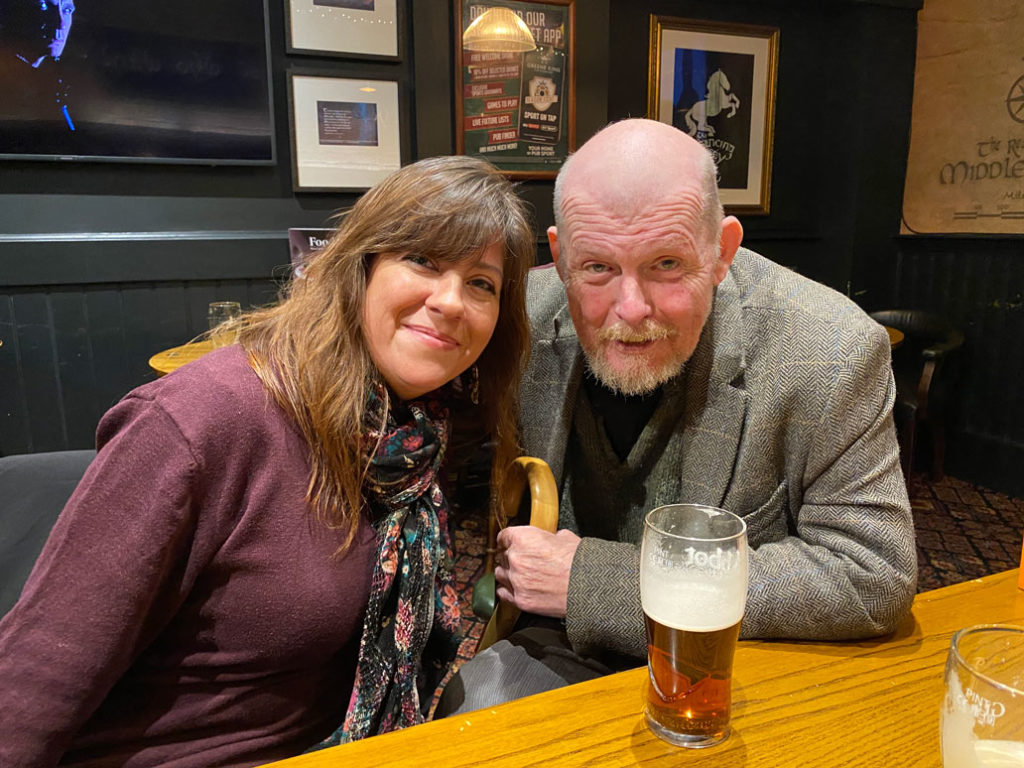Adrian Wynne is my coolest friend ever. He brought long hair with him to Sir William Borlase’s School in Marlow, where we met in September 1968. His father, an RAF squadron leader with the same christian names as my dad, had moved to RAF Medmenham, a couple of miles up the road from Marlow, that summer, bringing Adrian with him from his boarding school in Norfolk.
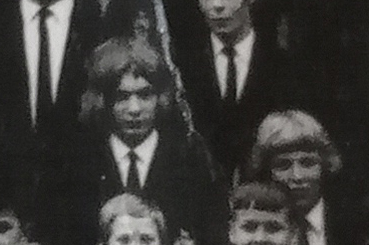
Adrian was already wild. It wasn’t breaking out from boarding, because he had loved his time as a boarder. It wasn’t the beer and getting high, although there was that, and it wasn’t his rock and roll obsession, although there was that too. It was the energy, the intensity, the feeling that anything could happen around him, and often did.
A man with a military buzz cut spontaneously accosted us, I don’t remember where, maybe in London, and told us to get our hair cut. Our hair wasn’t that long at all, but it had become as important to me as it was to Adrian. He gesticulated wildly back at military buzz cut, shouting right in his face, “join the army and dig trenches: that’ll make a man out of you!” Now that was what buzz cut might easily have said to us, and it took me a minute to understand that Adrian, a military brat himself, was turning buzz cut’s own language against him. Nonplussed, buzz cut scowled, glared and walked off. We just laughed. Go Adr!
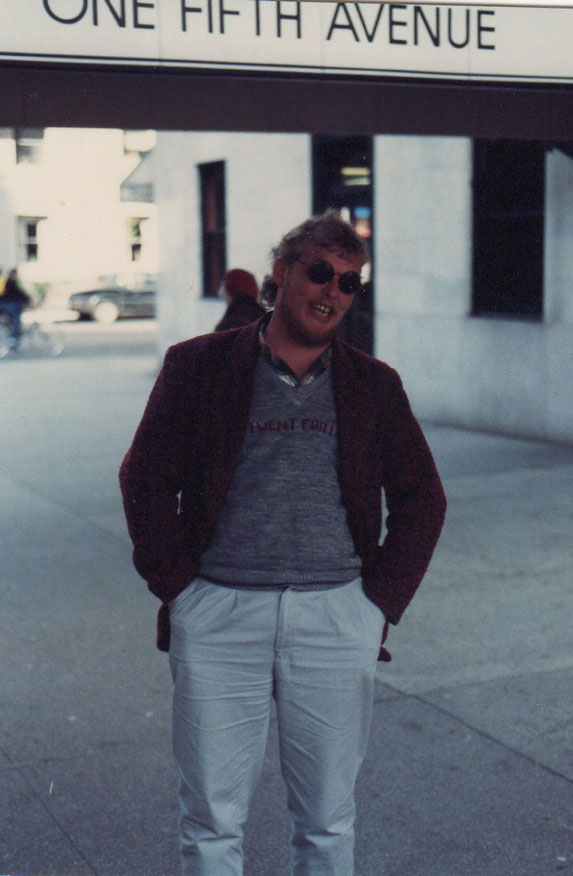
Another time we were on our way to a rock festival, forget which one, and stopped off in Solihull, the snobbish suburban town in the Midlands where I had lived for a few years growing up. It just happened to be on our route, and we just happened to end up in a Woolworth’s or Boots or some other bright, wide open retail store. Where there was a small boy screaming his head off, quite deliberately, very angry, not hurt. Just a petty annoyance when you are not responsible for the child, but it was hard to understand why the parents were doing nothing to quiet him down.
Without any warning, as we walked by, Adrian locked eyes with the child and roared, no words, just a loud and brazen roar. The kid shut up, immediately, and looked up at Adrian with big startled eyes. We sauntered on.
We were in his kitchen on the RAF base one evening after school, one or two others with us, I forget who, taking turns with his hash. That was our high of choice in England back then: no pot growing in the neighborhood, nor even in the next country, but plenty of hash coming in the from the Middle East and Pakistan. His mum was in the living room, his dad having a quick one in the Officers Mess on the base, and a good warm buzz was settling in in the kitchen.
Adrian started playing Led Zeppelin 2, loud, on the record player: my first time. Expecting a lot, I found it uncomfortably loud. “There’s something happening here and you don’t know what it is, do you Mister Jones?” Bob Dylan had asked, and I didn’t. To be honest, I felt uncomfortable, and only kept listening because Adrian loved it and I already trusted his taste.
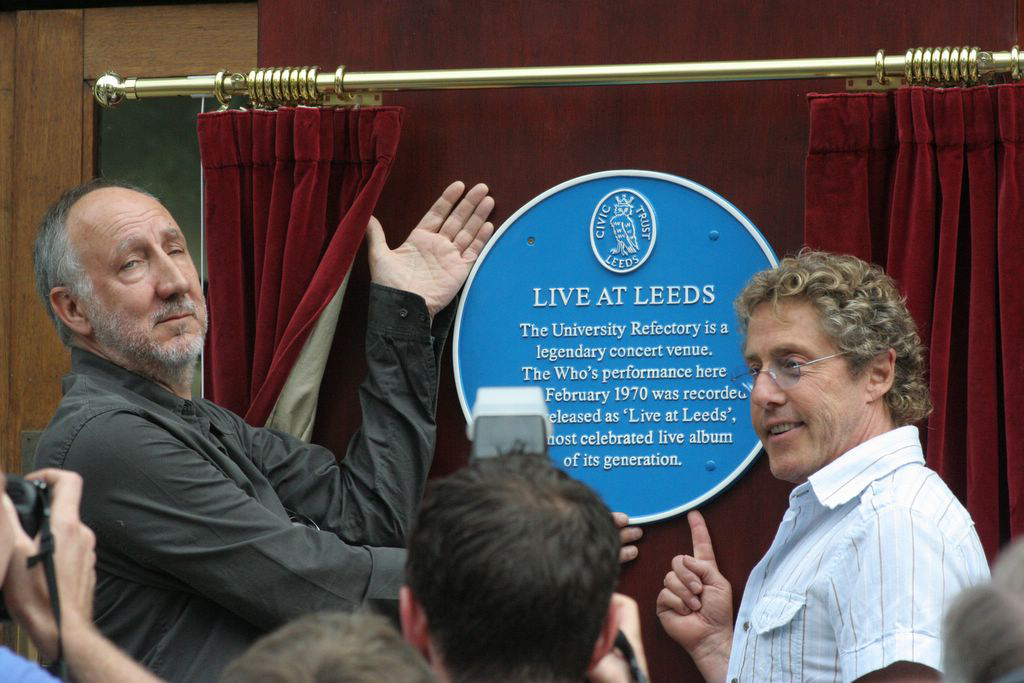
But the line had been crossed, I kept listening to the album over the ensuing months, and then we saw them playing live at the Bath Festival of Blues and Progressive Music in Shepton Mallet. Now that I got! And real, loud and dirty rock’n’roll had arrived in my life, courtesy of Adrian.
We left Borlase’s in the summer of 1970 after taking our “A” levels, the British equivalent of graduating high school. We often sparred, intellectually mostly, and each of us felt adolescent distrust of the other at times. He would always be part bluster, some times in large part. At other times, he was quite beautiful. In late 1970, he wrote me a letter suggesting that we get off our “idealistic arses” and form an International Peace Union.
A few months later, he was half-way through his first year of a metallurgy degree at Leeds University, a degree that he would eventually switch for something in software, and I was a couple of months into a pre-university training course in Harrogate with the Central Electricity Generating Board, the nationalized electricity monopoly. That didn’t last either. For just a few months, we were neighbors, not 40 miles apart.
On March 13, 1971, the Rolling Stones played the Refectory at Leeds University, and he and Barbara, his American girlfriend, invited me. They had queued up for 24 hours along the pavement in order to buy the tickets, which were being sold for ninety pence each, less than a pound, on a first come, first served basis, and they bought three. That included one for me. We were going to see the Stones.

The day of the concert, I arrived in Leeds late. Why I was late is beyond me: this was by far the most important trip during my stay in Harrogate. But late I was. Adrian, Barbara and their housemates were waiting for me in their terraced house about a mile from the University. Their tickets did not give their holders a particular seat.
So the best seats would go the first to queue before the doors opened, and they told me that the queuing had started the night before. Even if I had arrived earlier, they weren’t up for spending another 24 hours queuing anyway. It was still winter in Yorkshire, and there was a bone-chilling mist in the air, which hung there all weekend. They had already braved the Yorkshire winter night once to buy the tickets. This time, we decided that it was too late anyway to make any difference, and settled down for a couple of beers and a few hits, listening to music. I don’t remember what we listened to on that occasion, probably the Stones, but I do remember that house being associated with my discovery of American Beauty and Workingman’s Dead. “Just keep truckin’ on!”
We happily and jauntily arrived in front of the Refectory about an hour before the doors were to open to let the crowd in, pretty much the last audience members to arrive. Adrian was on a roll, as only he could be. With Barbara on his arm and me following, he was chatting with complete strangers, accosting others, and generally having a great time. He was partying, and it was infectious. When he was on, he was really on. Hunter Thompson went to Vegas a year or two before, “just sick enough to be totally confident.” He could have been Adrian on a good day. We walked back along the queue, around the block because it already contained the maybe 2000 people who had tickets for the concert and snaked its way almost entirely around the auditorium.
Adrian started telling the people waiting in the queue what to do. Some of the earlier arrivals had been there 24 hours already, hunched up against a cold and damp that penetrated their overcoats, hats and scarves. By now, they were eagerly waiting for the doors to open. The Stones didn’t come to town every day.

For Adr, the extrovert at play, hitting his groove, they were just another part of the pantomime. The first times, it seemed purely spontaneous, telling someone to pick up his litter, or somebody else not to block the people walking by. I can picture him still in my mind’s eye, sweeping along with his long golden blond hair lying wavy on that blue crushed velvet cape, giggling, snickering, laughing, snorting, one after the other, friendly with some, teasing others, telling most what to do. As it was working, as people did what he told them, he continued, pushing his benign authority as far as he could, always smiling and having fun.
We turned the corner following the queue as it turned to avoid crossing the road. Barbara giggled a couple of times in an embarrassed manner, hesitating as was her wont when she was worried that Adrian was going a bit too far. He picked up on that, which was part of the gift, an immediate empathic feel for what the other person was experiencing. That’s why he got away with it, and why I loved him even as I played second fiddle, that incredible empathy.
He instructed Barbara to take a serious toke on a joint whose owner he also instructed to share it with us. Everyone was laughing at what, if you think about it for a moment, was a very clever exercise of peer authority. The cop who gets high is going to be a popular cop. I started joining in with instructions and play as we moved further back down the line, but this was Adrian’s moment. As we walked by, and as the crowd grasped as crowds do what we were doing, the line was magically tidying itself up before we could even speak.
We were approached by someone who acted and felt important. I gulped, inwardly. Had we gone too far, and annoyed the powers that be? Far from it. “You guys are doing a great job,” he announced, “but where are your badges? You have to wear your badges!” Adrian started explaining: he would have come up with something convincing, but the man in charge barely acknowledged him before continuing on. “It’s all right. These things happen. But you really must wear your badges all the time. Here are replacements. Don’t lose these. I don’t have any more.” The badges read “Concert Security,” or something similar.

We continued with our pantomime, and the important person continued on his way, content that things were going according to plan. I was getting into this role of concert cop, slower than Adrian, but hey, I liked showing off too! I would have continued doing what we were doing without more until the line started moving after the doors opened. Adrian is made of sterner stuff. He turned Barbara and me around, and led us back toward the front of the line, where we arrived still in character, concert security, about ten minutes before the doors were to open for the crowd. He knocked, and showed his badge. “Do you want us peeing on the street?” he asked, loudly. It was a problem that we had noted and discussed during our patrol, without seeing any way to handle it. There were no public toilets in the area.
“All right,” said the auditorium employee opening that door, “they’re over there.” In we walked, all three of us, Adrian, Barbara and me, across the large entryway of the auditorium to the toilets. We did our thing, and then regrouped and hid in a dark corner of the lobby, giggling for the few minutes until the doors were opened for the audience. Immediately they opened, we ran like hell into the main auditorium and all the way down to the stage, sliding to a seated position in front of it. It was about three foot high, and the three of us were sat right in front of it.
We were there first, before the hard-core fans who had frozen their butts all night, before the groupies or other hangers-on who had wangled themselves some sort of privileged entry. Adrian stretched himself out, as was his right, with his feet almost at the stage. Barbara sat in front of him between his thighs and leaned back on him. No-one was going to fit in front of us. It was a testimony to his style. I sat on his right, and tried to situate my trusty portable cassette recorder where the band could not see it but where it could record well. We settled in, and relaxed into the space we had so smoothly won. No-one hassled us, no-one tried to sneak their way in front of us that night. Everyone stayed seated. It was as if we were charmed.
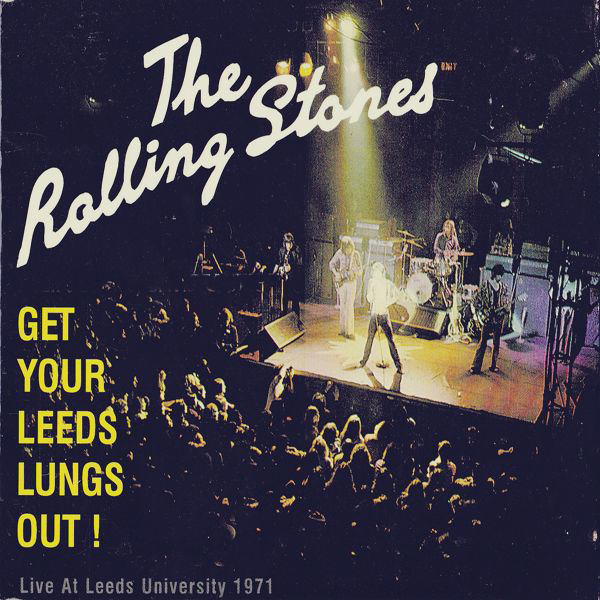
Enter, from stage right, the Rolling Stones!
I can still listen to “Midnight Rambler” from that concert, on the cassette that I recorded in front of the stage. My portable radio-cassette player was modest equipment to record such a show, and that the recording is still almost presentable is a tribute to the great acoustics in the auditorium. We were in the same auditorium where the Who had recorded “Live at Leeds.” I can identify Barbara chuckling at one point, but not a lot else from any of the three of us. Jagger introduced one song as “an up-tempo ditty,” short pause, “called Bitch!”
The brief British tour which this concert was a part of was billed as a farewell tour, because the Stones were going to leave England to avoid UK taxes. Well, all right then! Jagger still danced like a demon, skinny, muscular, flaunting it and, incidentally, sweating like a pig. Drops of sweat flew off him, shining in the floodlights that lit the band on the stage. I was never a Stones fan the way that I was a Beatles fan, but they put on a superb show: Jumpin’ Jack Flash, Satisfaction, Street Fighting Man, Honky Tonk Women and Brown Sugar all featured that cold Yorkshire night, and they all rocked.
The drops of sweat flew all over the stage, and they even landed on us from time to time. We were so close to such a small stage that Mick Jagger personally sweated on us. That’s the punch line. It actually happened: ask Adrian.
Years later, when I reminded him about that story, and how he got us into the concert at exactly the right time, with no strain or real effort on our parts, he took pains to clarify that he was only doing his job that night. He was on the Student Union’s Social Committee, he explained, and was supposed to help with concerts that the Union put on. That’s what he was doing when he started policing the line of fans waiting for this concert. And the guy who gave us the “Security” badges was another member of that Committee.
Well shoot! I lived the magic version of the story for forty years, and that’s the version I prefer.

I held on to the magic version of another story in Leeds for a shorter time, maybe thirty years, and again I prefer that magic to the likely reality.
This story was Pam’s, when she was dating Adrian. This must have been some time after Barbara. Pam was a junkie, at least according to Pam and Sue, her best friend whom I dated for a while. But it was a long time ago, and I’m not sure any more. I am sure that she used speed and barbiturates, because that is written in the 1972 World Peace Diary which Adrian gave me.

Adrian’s role with Pam seemed to be more therapeutic than participatory, adopting a basket case to attempt a rescue, but I didn’t ask too many questions. I avoided all that, everything to do with hard drugs. Looking back, that doesn’t make too much sense. I was dating Pam’s best friend, who as far as I knew did not use them. That too doesn’t make a lot of sense now. But maybe that’s the way it was. Hard drugs become a druggie’s whole life with alacrity, and I thought that I was avoiding them even if I was spending time with Pam and Sue. I was pretty scared of them.
This story again involved rock’n’roll, and again involved youthful extroversion, being “just sick enough to be totally confident.” This time, the extroversion was Pam’s. We were all at a rock festival together, Adrian and Pam, Sue and I, the 1972 Great Western Express Festival near Lincoln. I did not remember the name of this Festival, or where it was, until I found it in my World Peace Diary, and then on that superb site for memories of British festivals, www.ukrockfestivals.com.

Pam’s claim to fame, the one which no-one was uneasy about, was that she was a genuine rock’n’roll groupie. She liked musicians, and had the reputation of having a knack for getting close to them with ease. She was particularly excited that the Faces were playing at this festival: her hero of the moment was Rod “the Mod” Stewart. I don’t remember how it happened, but I’d probably expressed some doubt to Pam about her ability to score musicians. She did not have the perfect figure and model-like appearance often associated with groupies, and I had a bad habit of challenging people to prove their claims.
She asked if I wanted to go backstage. “You better believe it! That would really be something!” Sometimes bad habits can bring good results. Rising to the challenge, she dutifully wandered off to reconnoiter that essential component of rock festivals and concerts, backstage security.
Returning all smiles and totally confident, she motioned me to accompany her this time. Up she waltzed to the overweight backstage security guys, with skinny me sidling along rather tenuously beside her. She gave them a big smile, a huge smile, and they gave her a big smile back. How did that happen? Real concert security guys never smiled. Their whole role was being tough and forbidding. Everyone attending rock concerts craved going backstage and hanging out with their heroes of the moment. Security was the fragile barrier against all this, and security guys knew better than we did how fragile the barrier was. So they always glared at everybody they didn’t know. Yet here was Pam, the extrovert groupie, effortlessly strolling in with a stranger on her arm. How did she do that?

Then, as we walked in behind the stage, literally, right after passing security, a very drunk Rod Stewart staggered out of a tent or trailer smack in front of us and, staggering next to another man, leaning on his shoulder part of the time, stumbled his way toward the stage. Pam and I stood transfixed, and Rod locked his eyes on each of us as he made his lollygagging way forward. Perhaps we looked incongruous, stock still and gaping, perhaps he was simply focusing on us as the only people right in the middle of his field of vision to help himself stay upright. He’d obviously had a lot more than a pint or two.
That was my highlight of the festival, seeing Rod the Mod wobbling his way onstage before he started singing, feeling him staring at each of us, me and Pam. That satisfied my urge to be backstage, and I quickly left the area to watch the Faces perform from in front of the stage. Pam stayed, for quite a while. Not surprisingly, even Rod’s soulful voice couldn’t withstand that much booze, and the performance was pretty bad.
I told that little Pam story many times over the years, lauding her style and charisma to friends and strangers alike. Effortlessly going backstage with her right into the path of Rod Stewart felt like following Adrian into the Stones concert ahead of people who had been waiting 24 hours in the queue. I hadn’t seen her moves the way that I’d seen Adrian’s when he had spontaneously invented and played his concert security role so well. But I supposed that hers must have been just as good. The effect was the same, opening doors that nobody else could get through. She and he looked like a great match.

Sad to say, the match didn’t last long. I don’t know that I ever saw Pam again before she died, not a long time later, from an overdose. The story I told was in a way her epitaph, a testament to who she was and what she was able to accomplish, at least in our little rock’n’roll world.
It was with enormous regret that I realized after watching a documentary on groupies on the VH1 music channel maybe thirty years later that I may have missed the key fact about that backstage visit.
Adrian used to tease me about being naïve, and this may have been a classic example. Groupies interviewed for that documentary shared a trade secret for getting backstage: blowing the roadie who guarded the way. They made it sound like not a big deal for them: a quick blow job or two, and all doors in the concert hall opened the way to their heroes backstage in their dressing rooms. The world of a groupie was all about access. With a sick feeling in my stomach, I realized while still watching the documentary that maybe it portrayed Pam all those years ago as well. Maybe that was what she did to get us backstage that day, blow the overweight security guard before we waltzed by. At a minimum, that would explain her reconnoitering alone before taking me with her, as well of course as his big misplaced smile.
So much for her epitaph. Like I say, I prefer the naïve version, the one that lasted thirty years. What a terrible thing for Pam if the secret of her success was a willingness to blow sweaty security guys lacking the facilities for sprucing up even if they had the inclination to do so. Maybe that’s one of the reasons that she was always drunk or stoned.

I have a feeling that I don’t know much of what Adrian did back then. He was always looking out for others in his own sincere and committed way. And for a period during the early seventies, he spent a quite a while, on and off, in Northern Ireland. It was the time which became known as the “troubles.” He had been deeply disturbed by Bloody Sunday in Derry. When I asked him what he was doing there, his answers were vague, verging on incomprehensible, things like “helping people live together in peace.” I would pose follow up questions, to no avail. Practically speaking, what did it mean? His origins were Irish catholic, like mine, but he felt much more involved with his roots. My lot had emigrated to Tyneside during the potato famine. There’s a lot about Adr that I will never know.
Leeds was always Leeds, warts and all, and Adrian was always Adrian, warts and all. He and I had a falling out at some point in the summer of 1972, and after that the shared thrill of our youth was pretty much gone. It was nothing really, just a beautiful girl we met named Margaret. She kissed me, just like that, when I turned around in the driver’s seat of my 1959 Chevy to continue a conversation. This was somewhere in North Ontario, and I was instantly hooked. In Alberta, she ended up with Adrian, and I ended up sulking about it for years. I have always been me, warts and all.

A year or two later – things get very misty in the ‘70s, if you actually lived them! – I visited Adrian and Mandy, his first wife, in the house where they were living in Reading, only a half hour drive from Marlow. His brother Gerald was there too. It felt like a strange visit, as if the three of them were hiding some sort of secret, yet making it obvious that they were doing so. Of course, we were smoking hash, which may have contributed to that perception! But equally there was Pam, already dead, and Mandy too died prematurely, several years after she and Adrian broke up. I’ll never know what was happening, if anything, during that visit to Reading.
Just as I’d rather remember the magic story of how easily Adrian got the three of us in front of the stage at that incredible Stones concert, so I’d rather forget whatever went wrong during our trip to Canada. Just as I’d rather forget the likely truth of Pam’s groupie adventures and the hard drugs that were certainly in Adrian’s entourage, so I’d rather remember the extraordinary long-haired golden blond boy who introduced us to Led Zeppelin II in his mum’s kitchen.
I’d rather remain naïve, even after the years have made that hard.
